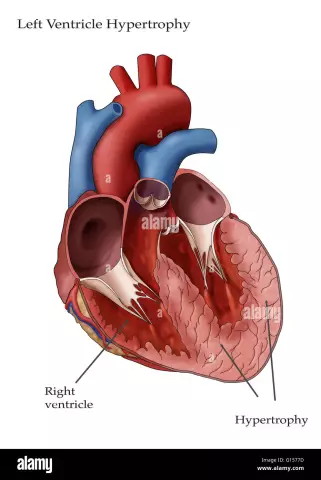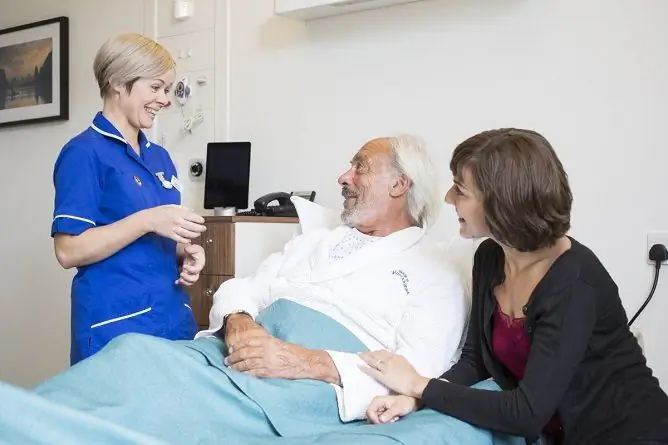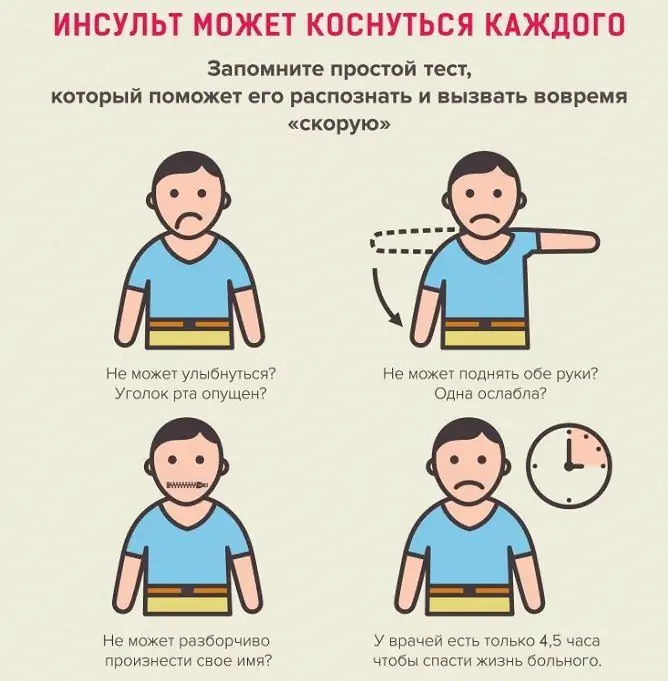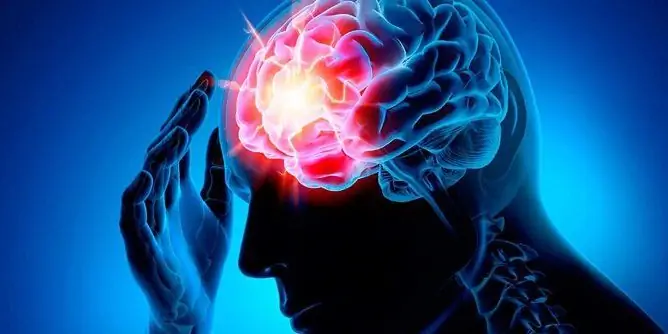- Author Rachel Wainwright wainwright@abchealthonline.com.
- Public 2023-12-15 07:39.
- Last modified 2025-11-02 20:14.
Left ventricular hypertrophy

Left ventricular hypertrophy is a pathological condition characterized by an increase in the size of this part of the heart.
Left ventricular hypertrophy (hypertrophic cardiomyopathy) can develop both as a result of certain diseases and due to increased physical exertion, which leads to the need to provide the body with an additional volume of oxygen.
An increase in the size of the left ventricle of the heart does not belong to diseases, but to abnormal abnormalities that can lead to the development of many severe cardiovascular diseases.
Causes of left ventricular hypertrophy
Hypertrophy of the left ventricle, like the left atrium, can be caused by various causes, among which hypertension (high blood pressure) is distinguished as the main one. Other causes of left ventricular hypertrophy include:
- Aortic valve stenosis;
- Intense physical activity, during which the heart works in an intensified mode. An additional load on the heart without monitoring its work can lead to the development of pathological disorders, and in some cases, with prolonged and too intense exercises, to a heart attack;
- Obesity, which in many cases causes an increase in blood pressure and an increase in the body's need for oxygen.
In addition, there are a number of other diseases in which the left ventricle may enlarge, including Fabry disease and muscular dystrophy.
Signs of left ventricular hypertrophy
In the early stages, left ventricular hypertrophy usually develops without severe symptoms or pain. The further development of pathology is characterized by the following symptoms:
- Chest pain;
- Fainting;
- Shortness of breath;
- Dizziness;
- Heart palpitations;
- Rapid exhaustion with physical activity.
If these signs of left ventricular hypertrophy appear, you should consult a cardiologist, which will help stop the development of the disease in time and avoid complications.
Being a connecting link with a large circle of blood circulation, the left ventricle provides blood supply to all organs and tissues, as a result of which an increase in its size can cause the development of many cardiovascular diseases, namely:
- Heart attack caused by interruption of the blood supply to the heart;
- Heart failure, characterized by the inability of the heart to pump blood in a volume sufficient for the normal functioning of the body;
- Ischemic heart disease, in which there is an insufficient supply of oxygen to the tissues of the heart itself;
- Arrhythmias characterized by abnormal heart rhythms;
- Sudden cardiac arrest, manifested as an unexpected arrest of the function of the heart, as well as consciousness and respiration.
Treatment of left ventricular hypertrophy

To prevent complications that can cause left ventricular hypertrophy, it is recommended that a regular check-up with a cardiologist is recommended.
In the early stages of development of left ventricular hypertrophy of the heart, treatment is usually medication and includes the use of verapamil simultaneously with beta-blockers, which reduces the symptoms of pathology manifestations.
As an additional treatment for left ventricular hypertrophy, cardiologists recommend following a diet and giving up many bad habits - smoking, alcohol, late dinner. The therapeutic diet should include more fresh vegetables and fruits, fermented milk products and seafood, while reducing the volume of flour products (especially sweets), fried foods and animal fats.
It is also recommended to revise the training regimen, since physical activity against the background of left ventricular hypertrophy should be of moderate nature.
In some cases, surgery is indicated to remove the area of the left ventricle that has undergone hypertrophy.
YouTube video related to the article:
The information is generalized and provided for informational purposes only. At the first sign of illness, see your doctor. Self-medication is hazardous to health!






